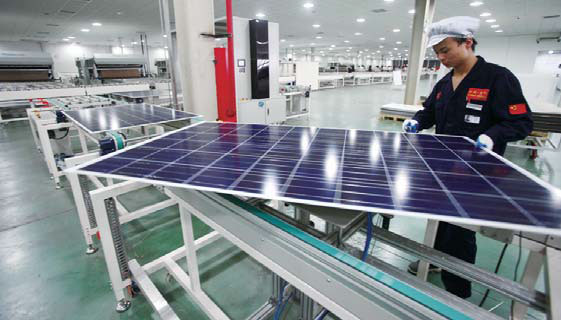China a climate leader for South-South cooperation
Experience with practical, affordable answers to carbon reduction will help many developing nations.
China is leading the way in South-South cooperation to tackle climate change challenges, as much of its technology, experience and learning in protecting the environment are shared with other emerging economies, experts say.
Much of Chinese technology fits emerging economies' need to reduce pollution levels realistically and affordably, they say.

A worker at Yingli Solar's Tianjin plant. Provided to China Daily
China's industrial ability to produce on a large scale also allows rapid commercialization of new technology, which can then be exported to emerging economies as Chinese companies go global.
"China can easily and readily transplant technologies and know-how that are applicable to manufacturing, assembly lines, extraction and exploration of raw materials and energy to countries in Asia as well as to Africa," says Christopher Bovis, a business law professor at the University of Hull.
"By leading South-South cooperation and committing toward coordinated intended nationally determined contributions, China assumes the role and responsibility of a leader in the making of the new international treaty on carbon emissions reduction."
Intended nationally determined contributions are the emission reduction amounts each country has voluntarily set as a target before the United Nations climate conference in Paris. The European Union would cut its emissions by 40 percent, compared with 1990 levels, by 2030. The United States would cut its emissions by 26 to 28 percent, compared with 2005 levels, by 2025.
China aims to cut greenhouse gas emissions per unit of GDP by 60 to 65 percent from 2005 levels by 2030. China will also increase the share of non-fossil fuels as part of its primary energy consumption to about 20 percent by 2030, and peak emissions by that time.
China has also demonstrated that it is keen to help other countries tackle climate change. When President Xi Jinping was in the US in September, he announced that China would set up a China South-South Climate Cooperation Fund to provide 20 billion yuan ($3.1 billion; 2.9 billion euros) to help developing countries.
Xi also said China would set up another fund with initial spending of $2 billion for South-South cooperation and aid developing countries to implement the UN post-2015 Development Agenda.
But experts say China's contribution is much greater, as knowledge and resource sharing can make a big impact.
"Growing economies have the opportunity to build low-carbon energy systems from inception, avoiding some of the challenges of retrofitting faced by the North," says Tom Jennings, director, policy and markets at the Carbon Trust, a London based nonprofit group.
Chinese companies in wind, solar power and hydropower have became strong competitors internationally and their technology is now exported all over the world, Jennings says. They include wind power firms Goldwind and Longyuan and the solar company Yingli.
China's experience in setting up and operating carbon trading schemes could prove useful for countries such as India and Brazil, Jennings says. Another example of China's experience in making gradual improvements is its shift away from coal, says David Tyfield, a researcher in environmental innovation and sociology at Lancaster University.
"Ideally, from a climate perspective, coal would be abandoned as soon as possible and replaced first by lower greenhouse gas fossil fuels and renewables, before fossil fuels are phased out altogether. However, from a development perspective, the rapid shift away from coal seems unlikely since coal is cheap, abundant and easy to use."
Tyfield says China's experience in coal reduction is useful for countries like India and Indonesia, heavy coal consumers. China has developed a range of lower-tech low-carbon technologies.
China also has expertise in green finance because of the huge efforts the country has made to develop a strong market for green bonds and other products, says Sean Kidney, CEO and co-founder of Climate Bond Initiative.
Kidney says that climate finance initiatives greatly depend on infrastructure building, financing and regulation, in which China has extensive experience. He believes China-led multinational institutions such as the Asian Infrastructure Development Bank and New Development Bank would play a key role in passing on China's ideas in green finance to other emerging countries.

Follow us on WeChat
京ICP备18041594号-1
京公网安备 11010202005508号

Follow us on WeChat


